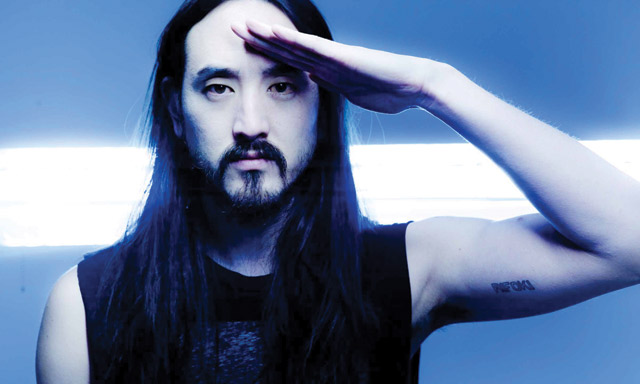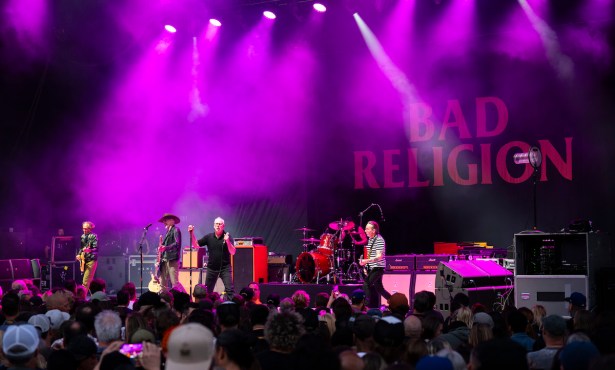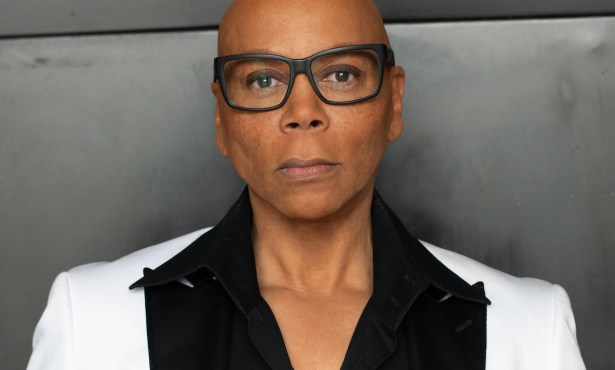Steve Aoki Expands His Horizons
The UCSB Grad and Dim Mak Founder Plays the Earl Warren Showgrounds

Martial arts and music are not so different; both are tied to the body and how to achieve its best efficiency. In the case of Steve Aoki, globetrotting deejay and founder of Dim Mak Records, the two are one in the same. Music is most certainly a doing word for the former UCSB student, who, since founding his label in 1996, has helped some truly indelible acts find their footing in the U.S., including Bloc Party, MSTRKRFT, and Battles. Most recently, Aoki has set his sights on conquering the kingdom of dubstep, the busiest and buzziest genre emerging from electronic music that has kids mobilizing in droves. To this end, he signed Canadian deejay/producer Datsik, who will be accompanying him on his Deadmeat tour alongside a menagerie of other artists on his label. Aside from all this, in January alone Aoki has still managed to release a single with Tiësto, a remix for Bassnectar, and his second album of original material, titled Wonderland — his first full-length since 2006. Not a bad start for the new year.
Aoki’s relentless energy was all too evident as I caught up with him on the phone in the middle of a trip to Vegas. Even over the din of the casino, I could fully hear the conviction in his voice as he described the recent doings of Dim Mak, named after the “death touch” of Chinese martial arts lore. “Efficiency is anything that scores,” Bruce Lee once said. “One utilizes all ways and is bound by none.” Certainly the right approach when applied to music, as well.
Wonderland has a huge range of guest personnel. What do you see as the uniting factor between them? The uniting factor is essentially me. The way I see this album is a culmination of all the different influences and sounds that have been a part of my life for the last four years. My goal for this album was to be totally eclectic and totally diverse. I wanted to showcase all these different sounds that I love, because the thing is, I love all kinds of music. I’m a punk, a hardcore kid, a raver; I love hip-hop, rap … in that token, I wanted to work with all these different artists and also work with their swagger and style, as well. So the album is meant to be a proper album of songs, rather than the bangers and singles I’ve been putting out the last couple of years.
Dubstep is obviously a big influence on Wonderland. To what do you attribute the genre’s massive popularity? It’s a new style for people. It’s actually been around a long time, but it’s finally emerged with certain artists. I think what it is is artists who put melody along with the heavier side of dubstep; it makes it so interesting for people. Skrillex is like Daft Punk; he really commercialized dubstep because he put amazing melody and incredible, heavy sounds in his tracks so that all kinds of people can listen to it and not be alienated by it. It’s all about certain traditions that can bring a sound or culture to the masses. Like Justice, in my opinion, in ’07 — they were the artist who put electro on the map. In 2011, Skrillex brought dubstep to the masses.
What can we expect from Dim Mak this year? We’re putting out Datsik’s album this year. We’re actually putting out Infected Mushroom’s album, as well, and broadening our horizons as far as sound. I’m involved in helping curate and making it different. They have their own lane, of course — they’ve created their own sound — but now they’re trying to do something unique and newer, and we’re helping build that new lane for them. So when you guys hear it, it will be a collaboration. We’re putting out [an album] called Evilution — it’s Datsik and Infected, and it’s coming out in February or March.
It seems like you have been phasing out bands in favor of deejays/producers. Is this a conscious thing on your part? Well, we’ve evolved through so many different genres across the last 15 years. At one point, we were putting out hardcore and emo. The thing is, as I said, I love all kinds of music. In 2007, we stopped putting out indie bands and made a diligent effort in the dance community and signed MSTRKRFT and The Bloody Beetroots. They required a lot of our attention, because when you sign someone at that scale, you really have to give them the time and the opportunity to help build them. So I made that decision to focus on those two artists rather than try to find the next Bloc Party, or the next Gossip, or something like that. So when that happened and they were becoming more and more successful, our work also increased, so we just tried to focus on that.
What do you have to say to kids struggling with music? How do you break out of the DIY mentality? You never break out of the DIY mentality. It’s always been part of Dim Mak’s business model. When we have people coming into the office, we’re pitching them that same concept: Get your feet, get your hands dirty. You’re gonna have to do the work yourself. You can’t really rely on too many people. No limitations: That’s DIY. If you don’t have the money, find a way to get it. You might have to do certain things to get there, like what I was doing early on: I was stealing. I was stealing from Kinko’s to make all my copies. My friend worked there, and luckily I had that outlet to make all the inserts for my LPs and 7 inches. The Dim Mak motto is “by any means necessary.” You’ll find a way if you really believe in what you’re doing.
4•1•1
Steve Aoki plays the Earl Warren Showgrounds with opener Datsik on Friday, January 20, at 8 p.m. Visit collectiveeffortevents.com for tickets.



